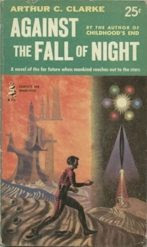 Completing our tribute to the late Arthur C. Clarke, the Book of the Week is Tales of the White Hart by Arthur C. Clarke. This is a paperback original, published in 1957, cover art by Richard Powers.
Completing our tribute to the late Arthur C. Clarke, the Book of the Week is Tales of the White Hart by Arthur C. Clarke. This is a paperback original, published in 1957, cover art by Richard Powers.Tales of the White Hart reflects Sir Arthur's lighter side, a collection of tall tales related by the patrons of the White Hart tavern. It is one of the most successful examples of the "space bar" subgenre, bizarre science fiction or fantasy stories swapped by the regulars of a particular pub, almost always to comic effect. (As Tales of the White Hart demonstrates, this subgenre long predates the space bar scene in the original Star Wars film.) My personal favorite space bar collections will appear in future BOTW's, but first we will pay tribute to an outstanding science fiction artist who passed away last week.





